“Do Not Destroy Our Life! Stop Funding Cirebon Coal Plant-Unit 2!”
Indonesian Local Residents Came Over to Japan to File the Objection
JBIC Decided to Finance the Indonesian Coal Plant Project Despite the Residents’ Victory in District Court
May 29, 2017
On May 24, 2017, two community members affected by “Cirebon Coal-fired Power Plant Project in West Java, Indonesia” (*1) came over to Japan and handed the objection to the Japan Bank for International Cooperation (JBIC) on the expansion of Unit 2 power plant (1,000 MW). At the same time, Indonesian and Japanese NGOs handed the complaint to the Japanese National Contact Point (NCP) under the OECD Guidelines for Multinational Enterprises (MNEs). Japanese public and private sectors, including Marubeni and JERA as investors, have pushed through the project.
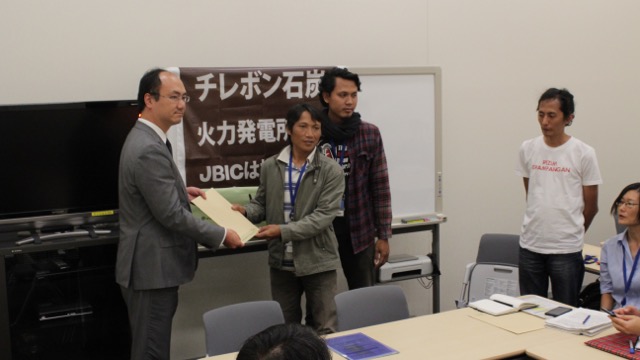
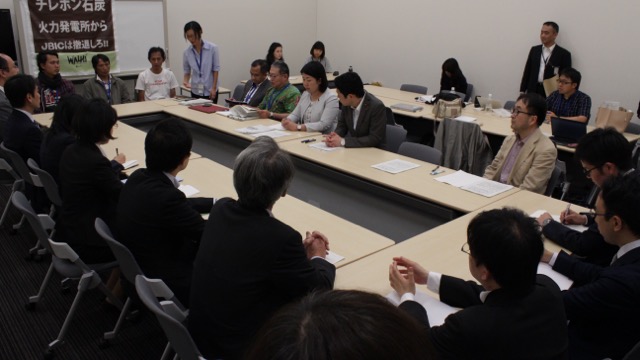
Download available here:
> Objection to JBIC (English Translation) (“Objection Regarding the Cirebon Coal-fired Power Plant Project - Unit 2 in West Java, Indonesia” by the local community group “RAPEL”)
> Annex of Objection to JBIC (map showing the fishing grounds by small-scale fishermen)
> Complaint to Japanese NCP (“Complaint Against Marubeni and JERA Regarding the Cirebon Coal-fired Power Plant Project in Indonesia” by WALHI and Friends of the Earth Japan)
Among 4 members who came over to Japan were; two members from the local community group RAPEL, a staff of WALHI (Wahana Lingkungan Hidup Indonesia) and a lawyer, who has been supporting the local community. RAPEL submitted the objection to JBIC and demanded the suspension of its loan disbursement for the project, pointing out several violations of JBIC’s environmental and social guidelines, such as the compliance of host country’s law and the submitting of environmental permit. WALHI and FoE Japan also submitted the complaint to the Japanese NCP, claiming that the Japanese companies, Marubeni and JERA, are breaching the OECD Guidelines for MNEs. The OECD Guidelines stipulate that obeying domestic laws is the first obligation of enterprises.
Two Diet members, namely Ms. Tomo Iwabuchi and Mr. Ryosuke Takeda (members of the House of Councilors: Japanese Communist Party) personally witnessed the two Cirebon community members submitting their objection at the building for members of the House of Councilors in the afternoon of May 24.
During their visit to Japan for several days, the community members and NGOs had separate meetings with JBIC, Ministry of Finance, and Marubeni, and took a protest action in front of JBIC. They also spoke in a press conference and a seminar, reporting their current situation affected by the project, the contents of the lawsuit and the district court’s verdict, and the reason why they decided to submit the objection to JBIC this time.
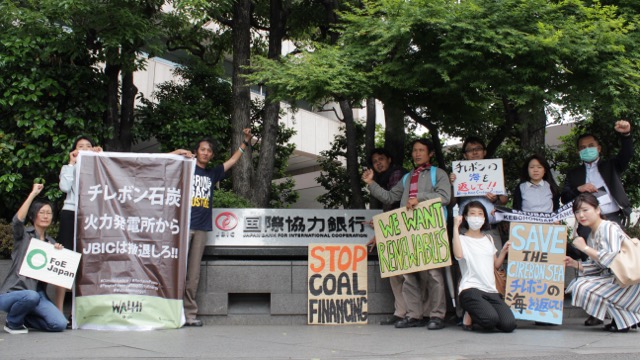
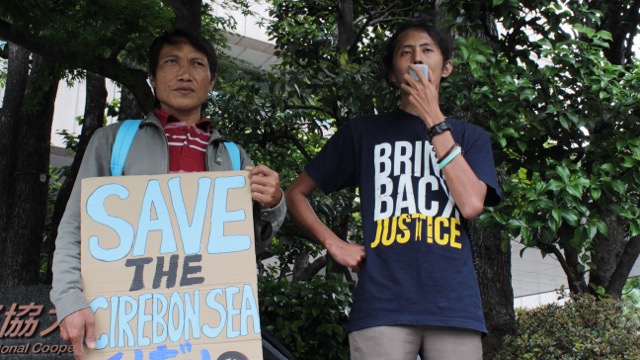
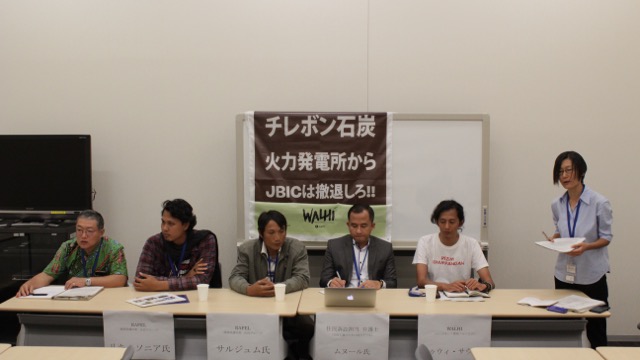
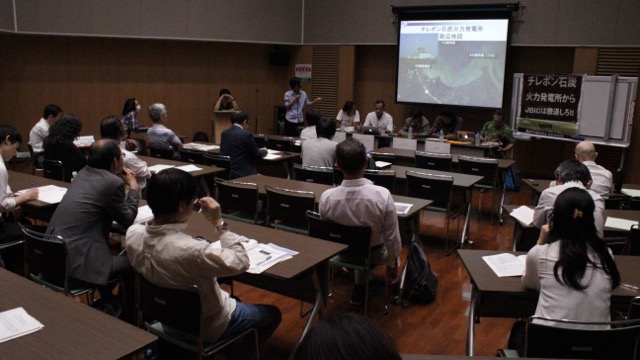
The Unit 1 of the Cirebon project (660 MW) has already caused serious damages to the livelihood of local community, such as small fishery. In order to prevent further damages to their life, the community group, Rapel (Rakyat Penyelamat Lingkungan: People Environment Safer) filed a lawsuit against the provincial government of West Java, claiming that the environmental permit for the Unit 2 project hadn’t been issued in proper manner. On April 19, the district court in Bandung admitted the community’s complaint, and revoked the environmental permit in its verdict.
On the other hand, even though JBIC confirmed in its own response in the Diet on April 13 that it had recognized the progress of this court case, JBIC signed the loan agreement for the Unit 2 project on April 18 one day before the court decision, neglecting the residents’ rights and the judicial decision in the host country. As the West Java provincial government has already expressed its intention to lodge an appeal to the High Court on April 21, the environmental permit is currently still valid till the High Court or the Supreme Court concludes a verdict on this lawsuit. Thus, it is highly concerned that the project proponent would start the main construction work to build the Unit 2 power plant and that JBIC would disburse the loan for the Unit 2 project, even before the final court decision.
JBIC must closely investigate the illegalities of the Cirebon Unit 2 project, listening to the local people’s voices but not only what the companies and the government are stating. Japanese government and JBIC must sincerely take it into account the local community’s rights and the judicial decision in the host country and must not disburse its loan for the project.
(*1) Cirebon coal-fired power plant project in West Java, Indonesia
The Cirebon Coal-fired Power Plant Project - Unit 1 with a capacity of 660 megawatt commenced the construction work in 2007 and started its commercial operation in July 2012. The project has cost USD 850 million. The Cirebon project - Unit 1 has been developed by a consortium PT. Cirebon Electric Power (CEP) consisting of: Marubeni (32.5%), Korea Midland Power (27.5%), Samtan (20%), and Indika Energy (20%). PT. CEP signed a 30-year PPA with PLN in August 2007. JBIC, The Export-Import Bank of Korea, and private banks made a loan agreement with CEP in March 2010 with co-financing USD 595 million.
The Cirebon Coal-fired Power Plant Project - Unit 2 with a capacity of 1,000 megawatt is estimated to require an investment of USD 2.1 billion and is expected to be operational in 2021. Marubeni (35%), Indika Energy (25%), Samtan (20%), Korea Midland Power (10%) and JERA (10%) have invested in this Cirebon expansion project, and have established PT Cirebon Energi Prasarana (CEPR). CEPR entered into a 25-year power purchase agreement (PPA) with the Indonesian state power utility Perusahaan Listrik Negara (PLN) in October 2015. JBIC and the Export-Import Bank of Korea made a loan agreement with CEPR on April 18, 2017, although the details of co-financing with the private banks (ING, Mizuho Bank, Sumitomo Mitsui Banking Corporation, and The Bank of Tokyo-Mitsubishi UFJ) have remained to be announced officially.
(*2) NCP: National Contact Points
NCPs are composed and organized by each adhering governments such that they promote and implement the Guidelines, and provide an effective basis for dealing with the broad range of issues covered by the Guidelines. Japanese NCP consists of Ministry of Foreign Affairs (OECD Division, Economic Affairs Bureau), Ministry of Health, Labor, and Welfare (International Affairs Division), and Ministry of Economy, Trade and Industry (Trade and Investment Facilitation Division, Trade and Economic Cooperation Bureau).

